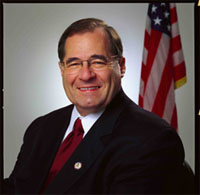DOMA repeal: All hands now on deck
When U.S. Rep. Jerrold Nadler (D-NY) introduced the Respect for Marriage Act in 2009, he conceded there was little chance for passage in the 111th Congress. Absent from the 102 co-sponsors that year was Rep. Barney Frank (D-Mass.), the most veteran and influential of the three openly gay members of Congress. He said the bill had “zero” chance of passage. Also missing was then-House Speaker Nancy Peolsi (D-Calif.) and Majority Leader Steny Hoyer (D-Md.) as co-sponsors, and there was no companion bill in the Senate.
Clearly, something’s changed.
When Nadler reintroduced his bill to the 112th Congress Wednesday morning, March 16, Frank, Pelosi, and Hoyer were among its 108 co-sponsors.
And the Nadler bill this year is joined by a first-ever companion bill in the Senate, introduced Wednesday by Democratic Senators Kirsten Gillibrand of New York, Dianne Feinstein of California, Patrick Leahy of Vermont, Christopher Coons of Delaware, and Richard Blumenthal of Connecticut.
What has not changed is the content of the legislation. The new Respect for Marriage Act is “precisely the same” as the last one, noted Nadler spokesman Ilan Kayatsky.
The measures seek to repeal the Defense of Marriage Act (DOMA). DOMA, enacted in 1996, prohibits the federal government from recognizing the legally secured marriages of same-sex couples and provides for states to ignore those marriages as well.
And there is still little likelihood of passage—at least in the Republican-controlled House. The bill will go to the House Judiciary Committee that is now chaired by Rep. Lamar Smith (R-Tex.), who late last year tried briefly to defend DOMA in federal court himself, saying the administration wasn’t doing enough.
But the legislation arrives to a political climate concerning same-sex marriage that is clearly changing.
The latest independent poll, completed March 1 and involving 1,504 adults nationally, shows—once again—a new high in support for allowing gays to marry. While 46 percent told the Pew Research Center they oppose allowing gays to marry, 45 percent said they favor doing so—a two-point jump in the space of six months. (Nine percent said they were unsure. The margin of error was plus or minus three points.)
A poll sponsored last week by the Human Rights Campaign found that 51 percent oppose DOMA, 34 percent favor it, and 15 percent had no opinion. When asked whether legally married gay couples should be able to obtain specific federal benefits provided to straight couples, 60 percent supported gay spouses being able to obtain Social Security benefits and 58 percent supported health coverage for federal employees’ same-sex spouses.
The HRC poll gave its respondents—800 registered voters nationwide—two statements and asked which came closer to their point of view about the House decision to defend DOMA in federal court. One choice was: the move diverts taxpayer money to a divisive issue at a time Congress should be focusing on creating jobs and cutting the deficit. The other choice was that Congress was forced to defend the law after President Obama’s administration “failed to do so.” Fifty-four percent chose the former, and 32 percent chose the latter. (The remainder said Neither, Both, or did not respond.)
In introducing the bill Wednesday, Rep. Nadler said Congress should not wait for the courts to declare DOMA unconstitutional.
“The responsibility for DOMA lies with Congress,” said Nadler, “and the time for dumping this shameful law is long overdue. Rather than prolonging litigation, Congress should repeal DOMA now and bring an end to the harm it causes gay and lesbian families each and every day.”
Feinstein announced last month that she would introduce a repeal bill, noting that she had opposed the passage of DOMA in 1996.
“It was the wrong law then,” she said, “it is the wrong law now; and it should be repealed.”
In a related development, bills were introduced to both chambers last Thursday, March 10, seeking to enable coverage for domestic partners under COBRA.
COBRA (Consolidated Omnibus Budget Reconciliation Act) is the federal law that requires group insurance plans to enable employees and their families to continue paying for their health coverage for a period of time following the loss or change in employment status.
In the Senate, the Equal Access to COBRA Act (S. 563) was re-introduced by Senator Barbara Boxer (D-Calif.) and has no co-sponsors; in the House, HR 1028 was introduced for the first time, by Rep. Anthony Weiner (D-NY), with 45 co-sponsors.
“Current federal laws related to COBRA coverage do not apply to domestic partners or same-sex spouses—even at companies that offer health coverage to domestic partners of employees,” according to a press statement from Boxer’s office. The proposed law, said the statement, would apply to companies that already offer health coverage to domestic partners and their children.



Leave a Reply